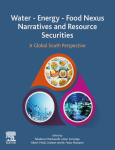Mabhaudhi T. (ed.), Senzanje A. (ed.), Modi A. (ed.), Jewitt G. (ed.), Massawe F. (ed.). (2022). Water - energy - food nexus narratives and resource securities: a global south perspective. Amsterdam (Pays-Bas) : Elsevier. 443 p.
https://doi.org/10.1016/C2020-0-03951-4
https://doi.org/10.1016/C2020-0-03951-4
| Titre : | Water - energy - food nexus narratives and resource securities: a global south perspective |
| Auteurs : | T. Mabhaudhi, ed. ; A. Senzanje, ed. ; A. Modi, ed. ; G. Jewitt, ed. ; F. Massawe, ed. |
| Type de document : | E-Book |
| Editeur : | Amsterdam [Pays-Bas] : Elsevier, 2022 |
| ISBN/ISSN/EAN : | 978-0-323-91223-5 |
| Format : | 443 p. |
| Langues : | Anglais |
| Langues du résumé : | Anglais |
| Catégories : |
Catégories principales 07 - ENVIRONNEMENT ; 7.4 - Ressources Naturelles : Paysage, Biodiversité, Patrimoine naturelThésaurus IAMM RESSOURCE EN EAU ; RESSOURCE ENERGETIQUE ; RESSOURCE ALIMENTAIRE ; GESTION DES RESSOURCES ; GESTION INTEGREE ; GESTION DES RESSOURCES NATURELLES ; DURABILITE ; SUD ; DONNEE STATISTIQUE ; ANALYSE SPATIALE ; ECHELLE SPATIALE |
| Résumé : | Water–Energy–Food Nexus Narratives and Resource Securities: A Global South Perspective provides a knowledge synthesis on the water–energy–food (WEF) nexus, focusing primarily on the global south. By presenting concepts, analytical tools, and case studies, the book serves as a practical resource for researchers, policymakers, and practitioners in sustainability and functional roles across all three sectors. It addresses key issues related to data availability, tools, indices, metrics, and application across multiple scales, beginning with a summary of existing knowledge. Finally, it examines the WEF nexus, presents global insights, and discusses future considerations and implications. This book presents an overview of existing knowledge on the WEF nexus and examines how such research aligns with emerging global WEF nexus perspectives, making it ideal for professionals, government entities, private industry, and the general public. |
| Note de contenu : |
Chapter 1 - The water–energy–food nexus: its transition into a transformative approach
Chapter 2 - Some quantitative water–energy–food nexus analysis approaches and their data requirements Chapter 3 - EO-WEF: a Earth Observations for Water, Energy, and Food nexus geotool for spatial data visualization and generation Chapter 4 - Scales of application of the WEF nexus approach Chapter 5 - Tools and indices for WEF nexus analysis Chapter 6 - Transboundary WEF nexus analysis: a case study of the Songwe River Basin Chapter 7 - Applying the WEF nexus at a local level: a focus on catchment level Chapter 8 - A regional approach to implementing the WEF nexus: a case study of the Southern African Development Community Chapter 9 - Exploring the contribution of Tugwi-Mukosi Dam toward water, energy, and food security Chapter 10 - The water–energy–food nexus as an approach for achieving sustainable development goals 2 (food), 6 (water), and 7 (energy) Chapter 11 - Enhancing sustainable human and environmental health through nexus planning Chapter 12 - Financing WEF nexus projects: perspectives from interdisciplinary and multidimensional research challenges Chapter 13 - The Water–Energy–Food nexus as a rallying point for sustainable development: emerging lessons from South and Southeast Asia Chapter 14 - The water–energy–food nexus: an ecosystems and anthropocentric perspective Chapter 15 - Water–energy–food nexus approaches to facilitate smallholder agricultural technology adoption in Africa Chapter 16 - Building capacity for upscaling the WEF nexus and guiding transformational change in Africa Chapter 17 - WEF nexus narratives: toward sustainable resource security |
| Cote : | Réservé lecteur CIHEAM |
| URL / DOI : | https://doi.org/10.1016/C2020-0-03951-4 |
| Contenu : |







